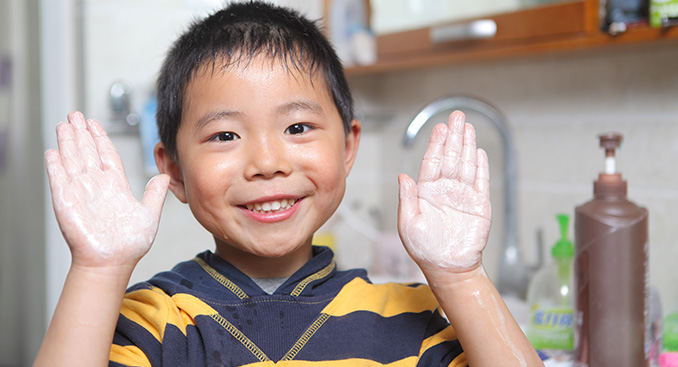Making Clean Hands Cool

Keeping little hands clean isn’t always easy, but according to experts such as William Logeman MD, a pediatrician with TriHealth’s Oxford Pediatrics, proper hand washing is one of the easiest and most effective ways to prevent the spread of germs and keep your child healthy. Experts recommend cleaning hands for 20 seconds with warm water and soap.
“That seems simple enough, especially given the importance,” Dr. Logeman says, “but as many parents can attest, even simple tasks may not always feel that way when young children are involved. That’s why it’s important to start early to develop healthy hygiene habits.”
How do you get little ones to stay at the sink that long? These ideas will help:
Make It Inviting
Equip the bathroom and kitchen with a handy step stool if needed. Then make sure soap and a towel are within easy reach of child-sized arms. Paint the kids’ bathroom a color they love or hang pictures of their favorite animals to make the space feel warm and welcoming.
Find Their Motivation
Consider buying a liquid soap that caters to kids. Some children love foaming soaps; others are more motivated to wash if their favorite cartoon character is on the dispenser. Still others may love a fun scent, like gingerbread, grape or bubblegum. Once the routine is established, you can always go back to using a more economical soap.
Keep Them Washing
To make sure kids spend enough time washing tops and bottoms of hands, as well as between fingers, have them sing the “Happy Birthday” song twice through at normal speed—it’s not a race! An egg timer can work, too.
Rock Those Routines
Children like structure. Routines help them understand what’s expected and then remember to do it. Especially when started at a young age, routines will continue long after your reminding has stopped. One example: Create a routine that everyone washes their hands first thing after returning home, whether it’s from school, work or playing at a friend’s house.
What About Antibacterial Soaps?
According to the Centers for Disease Control, washing with plain soap and water reduces bacteria on hands by 82 percent and helps keep people from coming down with colds, flu and gastrointestinal illnesses. Is antibacterial soap even better? The Food and Drug Administration (FDA) says no and has banned most of the antibacterial agents used in consumer soaps. Why? Because they haven’t been proven more effective than regular soap and there are questions about safety for both humans and the environment. You may still see antibacterial products on store shelves because a few antibacterial agents have not yet been banned—the FDA has given manufacturers another year to prove they’re more effective at protecting health than plain soap.